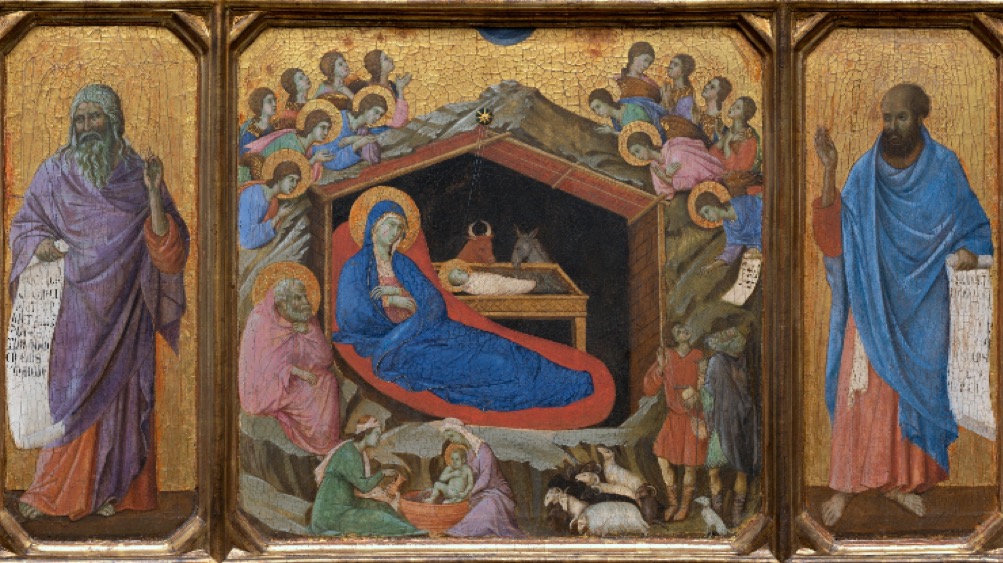Merry Christmas & Happy Hannukah
A Merry 1st Day of Christmas and a Happy Last Day of Hannukah to you and your families from Bookie and Wolfie, this being the Christian World’s 1,696th celebration of the Birth of Jesus Christ, & the Jewish World’s 2,187th celebration of Hannukah.
They go well together.
Luke 2:11-12: For unto you is born this day in the city of David a Saviour, which is Christ the Lord. And this will be a sign for you: you will find a babe wrapped in swaddling clothes and lying in a manger
Merry Christmas
The History of the Celebration of Christmas
In the ancient world, the “bleak midwinter” — the time around the annual winter solstice — was a time of celebration, in one form or another, throughout the ancient world. Crops had long been harvested and processed. Excess farm animals for whom there was not enough food to last the winter were slaughtered, so meat was available. Alcoholic beverages made from the harvested crops had fermented and were now ready to consume. Planting would not begin for another few months, so this was the least busy time of the year.
Three major holidays were held in the midwinter at various times during the existence of Ancient Rome — Christmas of course we know, but the other two, Saturnalia and Sol Invictus, we should know since their traditions at least in part inform our Christmas.
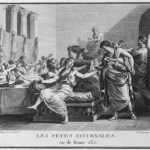 Dec. 17: Saturnalia – This was a major festival celebrated in Ancient Rome beginning in 497 B.C. to honor Saturn, the Roman God of agriculture and the harvest. Beginning on this day, the celebration would go on for six days in the city. All public offices and schools were closed. Public feasts were held, the temples held services and made sacrifices, gifts were exchanged, and social norms were ignored. The celebration continued annually until being subsumed by Christmas at the end of the 4th century.
Dec. 17: Saturnalia – This was a major festival celebrated in Ancient Rome beginning in 497 B.C. to honor Saturn, the Roman God of agriculture and the harvest. Beginning on this day, the celebration would go on for six days in the city. All public offices and schools were closed. Public feasts were held, the temples held services and made sacrifices, gifts were exchanged, and social norms were ignored. The celebration continued annually until being subsumed by Christmas at the end of the 4th century.
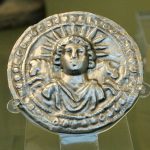 Dec. 25: Dies Natalis Solis Invicti – The cult of Sol, God of the Unconquered Sun (Sol Invictus), had existed in the empire since at least the 2nd century B.C. It became popular in Rome itself during the late Roman Empire, and in 274 A.D., the Roman emperor Aurelian set the feast day for the God as Dec. 25.
Dec. 25: Dies Natalis Solis Invicti – The cult of Sol, God of the Unconquered Sun (Sol Invictus), had existed in the empire since at least the 2nd century B.C. It became popular in Rome itself during the late Roman Empire, and in 274 A.D., the Roman emperor Aurelian set the feast day for the God as Dec. 25.
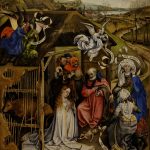 Dec. 25: Christmas – Ascribing the date of Christ’s birth to December 25 appeared as a purely academic matter in several places in early Christian history, most notably the writings of Hippolytus of Rome, circa 202-211 A.D.
Dec. 25: Christmas – Ascribing the date of Christ’s birth to December 25 appeared as a purely academic matter in several places in early Christian history, most notably the writings of Hippolytus of Rome, circa 202-211 A.D.
During the 2nd and 3rd centuries Christianity was deemed criminal in Rome and Emperors subjected Christians to centuries of bloody and horrific persecution, the most brutal being the last, the Diocletian Persecutions of 303-313 A.D. But, to quote Tertullian, “the blood of the martyrs was the seed of the Church.” That persecution ended in 313 A.D. when Constantine the Great issued the Edict of Milan, granting tolerance at law to the Christian religion within the empire.
Constantine’s Edict of Milan did not make Christianity the official religion of the Roman Emprie — that would not happen until 380 A.D. with Roman Emperor Theodosius I and his Edict of Thessalonica. But the Edict of Milan did allow Christianity to come into the open and to compete for souls against the other pagan religions being practiced throughout Rome and the Empire.
Part and parcel of that competition was the creation of the Christmas celebration. A chronology compiled in A. D. 354 stated, for A.D. 336,: “25 Dec.: natus Christus in Betleem Judeae.” Translation: On December 25th, Christ born in Bethlehem, Judea. It was the first recorded celebration of Christ’s birthday. We do not know how this first Christmas was celebrated. Most likely, Roman Christians held a common “Agape Feast” that they simply dedicated to Christ’s birth, that being a communal meal among early Christians dedicated to prayer and fellowship.
A year later, in 337 A.D., St. Julius I was elected Pontiff. He decreed in 350 A.D. that Dec. 25 would be set as the day to celebrate the birth of Jesus Christ. This was the first act of syncretism by the early Church. To explain, the Bible does not specify a date for the birth of Jesus Christ, nor does it give enough clues from which it can be determined with any reasonable certainty. We do not know the reasoning of Pope St. Julius 1 for setting the day of Christmas as Dec. 25, as he left us no clues, but it is reasonable to infer that he wanted to place a major Christian day of remembrance and feasting at the midwinter. And by doing so on the 25th of December, he set this Christian celebration at or near the same time as the Roman pagan celebrations of Saturnalia and Dies Natalis Solis Invicti.
Over the next few decades, the celebration of Christmas subsumed Saturnalia and Dies Natalis Solis Invicti, but it did not erase them. Even though Christmas came to replace those pagan holidays, it retained many of the customs of those holidays that were not in conflict with Christian dogma, Those practices, such as gift giving, were simply made a part of the Christmas celebration. This practice, of adopting pagan rights and customs into Christian celebrations so long as they did not conflict with Christian dogma, developed into a deliberate Church policy of syncretism. (Probably the most famous memorialization of a papal order to use the process of syncretism comes from the writings of the Venerable Bede, who notes that in 601 A.D., Pope Gregory sent a letter to his missionaries instructing them to adapt local customs and places of worship as part of the conversion process whenever possible.)
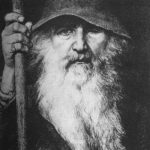 Scratch most any Christian holiday today and you will find it replete with pagan customs that long predate it. At Christmas, we celebrate with customs derived from the Romans at Saturnalia and Germanic customs, such as the yule log, Santa Claus and the hanging of Christmas stockings, are in the majority associated with Odin and the Yuletide. At Easter, we celebrate the resurrection of Christ. But the Easter bunny, the eggs, and even the name, Easter, are purely pagan.
Scratch most any Christian holiday today and you will find it replete with pagan customs that long predate it. At Christmas, we celebrate with customs derived from the Romans at Saturnalia and Germanic customs, such as the yule log, Santa Claus and the hanging of Christmas stockings, are in the majority associated with Odin and the Yuletide. At Easter, we celebrate the resurrection of Christ. But the Easter bunny, the eggs, and even the name, Easter, are purely pagan.
None of that takes away from the Christian purpose or meaning behind the respective holidays. But it does explain the ancient customs behind many of the holidays and it ties us to the richness of our shared history.
Mayim Balik Explains Hannukah:
Some famous events on the 25th of December:
169 B.C. — The First Celebration of the Festival of Lights
According to the Old Testament Book I Maccabees, Antiochus had invaded Judaea, tried to Hellenize the Jews, and desecrated the Second Temple in Jerusalem. Following the Jewish victory in a three-year struggle against Antiochus, Judas ordered the cleansing and restoration of the Temple. After it was purified, a new altar was installed and dedicated on Kislev 25. Judas then proclaimed that the dedication of the restored Temple should be celebrated every year for eight days beginning on that date. The custom of lighting candles to commemorate the victory over the Greeks is enshrined in the Talmud (Shabbat 21b), which describes the miracle of the oil in the Temple. According to the Talmud, when Judas Maccabeus entered the Temple, he found only a small jar of oil that had not been defiled by Antiochus. The jar contained only enough oil to burn for one day, but miraculously the oil burned for eight days until new consecrated oil could be found, establishing the precedent that the festival should last eight days.
508 – Clovis I, king of the Franks, is baptized into the Catholic faith at Reims, by Saint Remigius.
597 – Augustine of Canterbury leads a baptism ceremony in Kent of more than 10,000 Anglo-Saxons.
800 – The Coronation of Charlemagne as Holy Roman Emperor.
A pivotal moment in Western history came when Charlemagne, the Father of Europe, on this day entered Old Saint Peter’s Basilica to do no more than offer Christmas Prayers. Pope Leo III was waiting for him to arrive. When Charlemagne knelt in prayer, Pope Leo I approached him with a crown and proclaimed, by the authority invested in him as the Vicar of Christ on earth, that Charlemagne was the Emperor of the Holy Roman Empire.
Pope Leo III was likely trying to cement his papacy after coming under attack. He wanted to tie his papacy to the powerful King, Charlemagne. Charlemagne, for his part, claimed complete surprise at the act, though he did not balk at it.
The first legacy of Pope Leo III’s action was that he had elevated Charlemagne above the Byzantine Emperors in the East and gave Charlemagne claim to all of their lands, the most important of which was the conquered territories the Byzantine Emperors held in Western Europe. This set the stage for centuries of warfare between the Western and Eastern Christian empires.
The second legacy was that, with the right to rule being anointed by heaven and channeled through the Pope, it gave the papacy a claim to ultimate spiritual authority over temporal Kings. This would prove one of the most dominant and divisive issues in European politics of the next near millennium.
1000 – King Stephen I founds Hungary as a Christian kingdom after defeating the pagan army of his cousin.
1066 – William the Conqueror, Duke of Normandy, is crowned king of England at Westminster Abbey, London. When a cheer went up at his crowning, his guards outside thought they were under attack and began slaughtering the townsfolk and burning the buildings outside the Abbey.
1100 – Baldwin of Boulogne, an accomplished military commander during the First Crusade, remained in the Holy Lands and, on this day, is crowned the first King of Jerusalem in the Church of the Nativity in Bethlehem. He would reign for eighteen years.
1758 – Halley’s Comet is sighted by Johann Georg Palitzsch, confirming Edmund Halley’s 1705 prediction of its passage. This was the first passage of a comet predicted ahead of time. Halley had arrived at his predictions by applying to his calculations the laws of physics developed by his friend, Isaac Newton (a man who happened to have been born on this day in 1642 A.D.).
1914 – A series of unofficial truces occur across the Western Front to celebrate Christmas. It was a naive moment of hope in what turned out to be one of the world’s most costly wars.
1951 – A bomb explodes at the home of Harry T. Moore and Harriette V. S. Moore, early leaders of the Civil Rights Movement, killing Harry instantly and fatally wounding Harriette. They became the first martys of the 1950’s civil rights movement.
1977 – Israeli Prime Minister Menachem Begin meets in Egypt with its president Anwar Sadat. The latter was assassinated within four years by Islamic radicals of the Muslim Brotherhood for making peace with Israel.
Christmas Music
The lyrics from In the Bleak Midwinter are from an 1872 poem by Christina Rossetti. The lyrics were set to music in 1906 by Gustav Holst.
Joy to the World is a hymn written in 1719 by Isaac Watts, based on Psalm 98, 96:11–12 and Genesis 3:17–18.
Christ Was Born On Christmas Day is a carol widely known in 14th century medieval Europe.
Twelve Days of Christmas is an English carol first published in 1780.
The Macabeats perform Bohemian Hannukah
